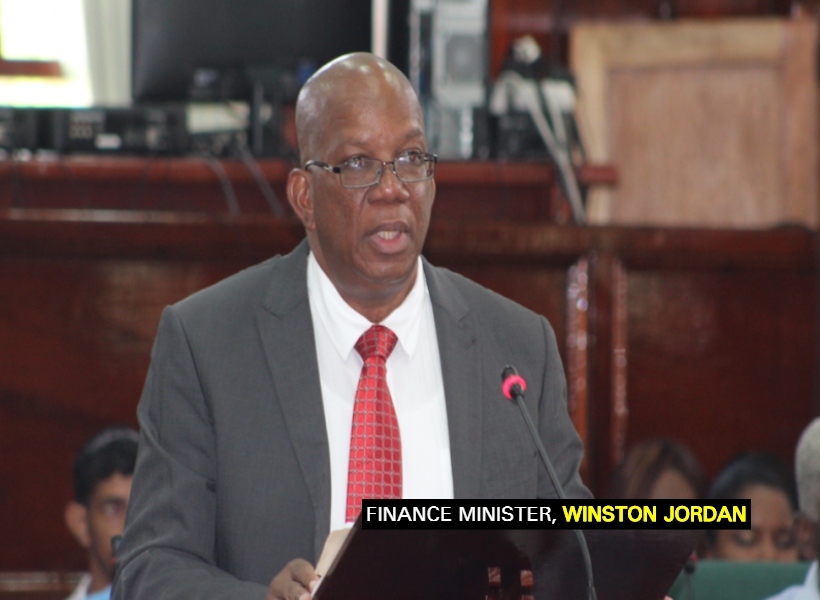Finance Minister, Winston Jordan presented the fifth and penultimate budget of the APNU+AFC Administration’s first term in office to Members of the National Assembly today. In his presentation that lasted almost five hours, Jordan revealed that the administration has appropriated $300.7B for the 2019 budget. This represents a 12.6 percent increase over 2018. The budget was presented under the theme, “Transforming the Economy, Empowering People, Building Sustainable Communities for the Good Life.”
Starting off with the performance of the domestic economy, the economist said that the target for real growth for 2018 was 3.8 percent. At the end of the first quarter, Jordan said that the outlook for the year was revised to 3.4 percent, given the lower-than-expected performance in gold and sugar. However, by the end of the first half of the year, the Finance Minister said that economic activity had picked up in several other sectors, resulting in robust half-year growth of 4.5 percent, and an upward revision of the projected annual growth rate of 3.7 percent, for 2018. On this premise, Jordan said that the latest projection for real growth in the Gross Domestic Product (GDP), for 2018, is 3.4 percent, a significant improvement on the 2.1 percent recorded in 2017.
Further to this, the economist said that the amount of money in the economy is anticipated to grow to approximately $386.5 billion. As such, Jordan said that the Government was able provide several increases to public servants. The increases are as follows:
(i) 7.0 percent increase to public servants earning less than $100,000 per month;
(ii) 6.5 percent to those earning between $100,000 to below $300,000;
(iii) 5.0 percent to those earning between $300,000 to below $500,000;
(iv) 3.0 percent to those earning between $500,000 to below $700,000;
(v) 2.0 percent to those earning between $700,000 to below $800,000;
(vi) 1.0 percent to those earning between $800,000 to below $1,000,000; and
(vii) 0.5 percent to those earning $1,000,000 and above.
In addition to this, the Finance Minister said, “As was the case last year, these increases are effective from January 1, 2018. In effect, the retroactive increase means someone earning $60,000 per month will receive a lump sum of $50,400, in December – a not insignificant supplement for the holiday season. Moreover, the back pay for 2018 will be paid free of income tax to all public sector workers, including teachers. The Government has also raised the minimum basic salary for each public servant to $64,200 per month.”
Jordan also proposed an increase to the Old Age Pension from $19,500 to $20,500. At the same time, he proposed to increase Public Assistance from $8,000 to $9,000. Both increases, which take effect from January 1, 2019, will see persons taking home an additional $800 million, in 2019.
The Finance Minister noted that the government will amend the Motor Vehicle and Road Traffic Act to increase the duration of a driver’s licence from three years to five years, and a small increase in the fee from $4,000 to $5,000. In keeping with prior amendments, Jordan said that pensioners will not pay any fee for a passport. The Finance Minister said that the longer duration will allow for the freeing of human and other resources, which will be devoted to the critical oil and gas area.
Exporters are also expected to benefit to a great extent from budget 2019, as the economist proposed the amendment of the Income Tax Act to so that they may receive a tax credit equivalent to the applicable VAT paid in relation to water and electricity. This will be granted once proven to the satisfaction of the Commissioner General of the Guyana Revenue Authority (GRA), that such VAT was charged and paid in relation to the goods manufactured and exported.
With regard to exemptions for several sectors as it relates to Excise Tax, the Finance Minister proposed the following:
1.Reduction of the Excise Tax charged on Shandy and other beverages containing less than 1 percent alcohol by volume, from $126 per litre to $65 per litre. The revenue foregone is $37 million.
ii. Reduction in the Excise Tax charged on indigenous wines and other fermented beverages that are manufactured using 100 percent local inputs, from $150 per litre to $65 per litre. The revenue loss is $128 million.
iii. New regime for taxing tobacco consisting of a combination of ad valorem and specific taxes as follows: the imposition of a specific Excise Tax of $2,500 per 1,000 sticks, together with Customs Duty of 100 percent and VAT of 14 percent. In addition to reducing smuggling and simplifying administration, the new regime should result in a net increase in revenue of $50 million.
iv. Exemption of pesticides used in the agriculture sector from Custom Duty and VAT. The revenue loss is $3.2 million.
v. Exemption of limestone used in the agriculture sector from Customs Duty. The revenue loss is $4.2 million.
vi. Exemption from VAT, aircraft engines and main components/parts.
vii. Exemption from VAT, concrete blocks used for housing and construction. This follows the exemption from VAT on complete housing units up to $6.5 million, which formed part of the measures in Budget 2018. Together, these measures will propel the housing drive, as Government seeks to make available decent and affordable homes to the population.
Jordan said that the aforementioned exemptions, among others, will result in a net loss of revenue of $3.5B.











